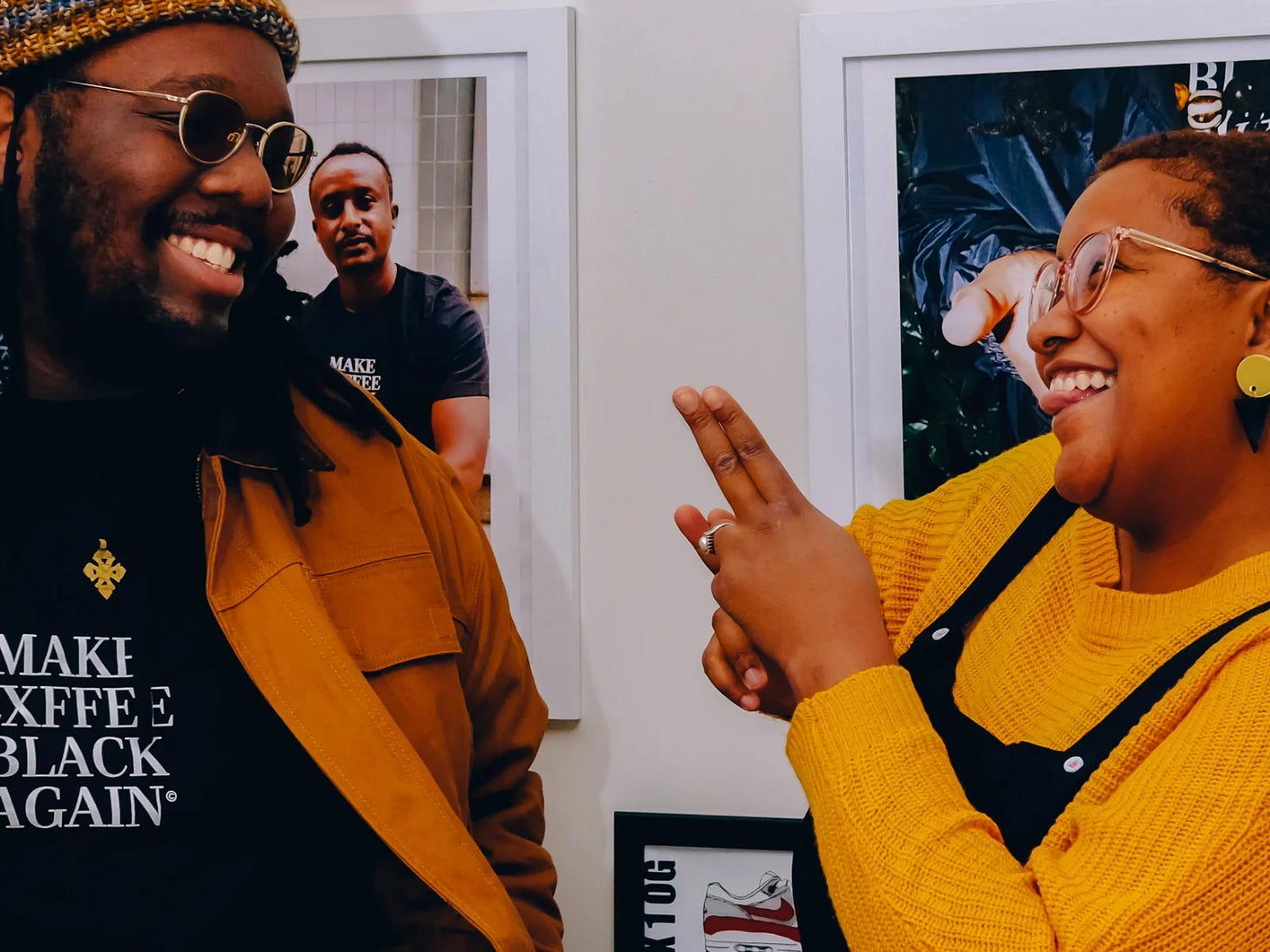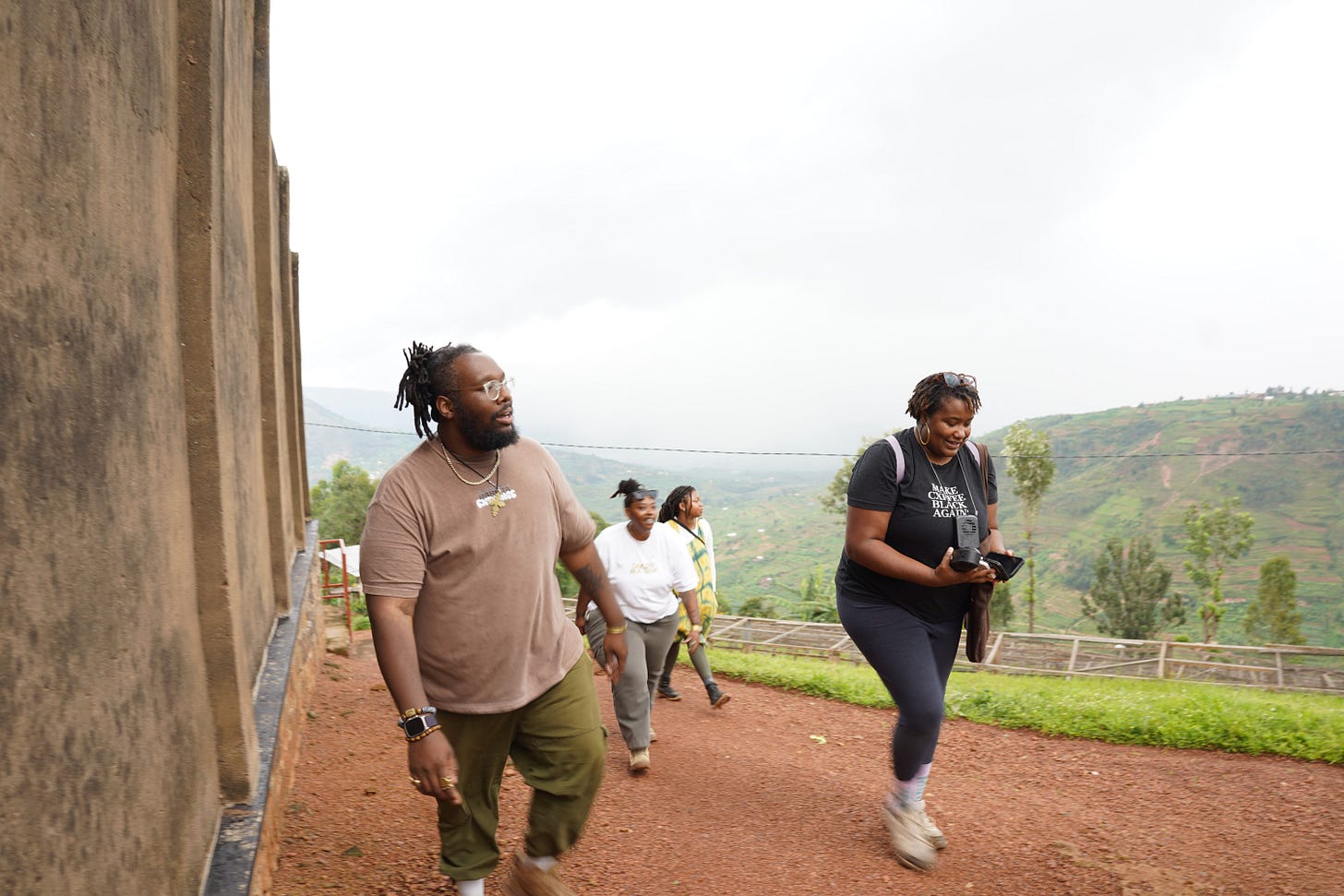Getting back to the root of coffee
An interview with the founders of Cxffeeblack
Friends. Today I want to do something a bit different, and introduce you to two people outside of my restaurants whose story and work I find incredible. I want to let them do most of the talking here, since they’re such amazing storytellers—but I did want to tell you how I think they’re changing the conversations around coffee in a positive way, in a way we can learn from when we think about food and agriculture around the world, always being thoughtful about what we consume and why.
Bartholomew Jones and Renata Henderson are the husband and wife behind the Memphis, Tennessee coffee company Cxffeeblack. I’ve never been but I’m hoping to go someday, to try their coffee and to talk to the community that they’ve built in their neighborhood. Bartholomew is a coffee educator, sharing his knowledge of coffee with his community and the world on his Youtube channel. Renata is a coffee roaster—as well as the company’s designer—having learned the art of roasting in Ethiopia. One of their goals is to create an entirely Black coffee supply chain, reclaiming some of the value of a half-trillion dollar coffee industry for the people who originally built it, and whose labor keeps it going.
A few years ago, the two of them were inducted into a coffee society in Oromia, the southern part of Ethiopia, in the region called Guji, which is home to one of the oldest coffee cultures in the world. “It was transformative for us,” says Bartholemew. “I believe that a reclamation of an indigenous perspective in coffee—and in humanity in general—would cause all of us to go through our own journeys, throughout our own bloodlines, to understand our own stories.”
They recently returned with a project they started, the Barista Exchange Program, where they brought four Black American baristas from around the US to Ethiopia, Rwanda, and Kenya, to learn about coffee as a fruit—specifically, one that originated in east Africa—and to learn about what is happening in the world of coffee outside of the US, in its birthplace.
Cxffeeblack as a project, according to Bartholomew and Renata, started with these questions: “What would happen if coffee culture loved people of color as much as it loved cash crops; and what if we cared for and celebrated single-origin people as much as we celebrated single-origin coffee?”
So many of the stories we hear about food today in the media are about the food itself—the ingredients, the preparations, the techniques. But if you’ve been reading Longer Tables for a while, you’ll know that it’s always been one of my goals to bring you some of the deeper stories, the histories and the people behind the foods we love, to celebrate the “single-origin people” behind the stories. So today that’s what we’re doing.
Besides being a coffee educator, Bartholomew is also a rapper, so it’s amazing to see how he uses metaphor to tell the story of coffee. “No sugar, no cream please.” Layer by layer, if you could strip away all of the cream and sugar, you would witness coffee returning back to its original state of Blackness. Similarly, if you could strip away all of the cultures and inputs that have layered themselves on coffee, you would trace its origin back to Blackness.
And the spelling of cxffee, according to Bartholomew and Renata, is this: The intentional “x” instead of the traditional “o” represents the missing variable in all of us, the part of the equation that requires us to be unique in our humanity, in order to help solve the problem that divides us.
To find their coffee and more, check out their website here. And if you’re ever in Memphis, check out the Anti-Gentrification Coffee Club, their shop. Bartholomew, Renata, and the Cxffeeblack team recently launched a fund to support their work; if you’re interested, look here—and watch some of the amazing documentary work they’ve done on their visits to east Africa.
And now, here’s Bartholomew and Renata in their own words. They’re such amazing storytellers, I don’t have much to add to this interview edited by my team.
What are you trying to do with cxffeeblack?
Bartholomew: What we’re trying to do is to honor our root. We believe that symbolizes a lot of what we think at the end of the day is missing from our own experiences as African descended people. It's seeing what has happened, how dishonored we've been, and the process of relearning what can happen when you truly go back to your root and acknowledge that and seek to honor that in the way that you live.
What if the world gained cxffee from the hands of the original stewards, rather than those who enslaved their labor? What new ideas, concepts, varietals, sciences, or culinary curiosities could come from such a bloodline? What new discoveries could come from truly Honoring Our Root?
What does coffee mean for you?
Bartholomew: There’s an ancient blessing in Oromo that's given when you receive coffee: "Buna fi nagaa hin dhabiina,” which means may your house lack no coffee or peace. Traditionally, this is a blessing you would give somebody the first time you serve coffee. So if you're at my house, and this is your first time ever having coffee with me, the first thing I’m telling you about the coffee isn’t how much does the farmer get paid, or if it’s fair trade…The first question is: Can we have peace with this cup? I think that’s counter to the narrative of what we see in social justice circles, because the conversation never really starts with us finding peace, creating a space for peace.
At the same time, coffee is a massive global industry worth $495 billion per year, but less than 1% of this revenue returns to people of African descent, highlighting the ongoing inequalities in the coffee trade—so how do we shift that? Farmers and their indigenous communities HAVE to be paid more, to be able to enjoy the fruit of their labor…especially those whose indigeneity is what has preserved this crop for us in the first place.
Why is it important to remember where coffee comes from?
Bartholomew: Why is it important for us to acknowledge the African heritage of coffee and in doing so also acknowledge a lot of the historical injustices that have happened? The reality is that there won't be any coffee in 50 years if we continue to dishonor its root in the modern way…and there's a ton of research to back this up. Part of it is the way that coffee has been pushed to its genetic limits by being spread around the world away from its original origin in such a hyper-capitalistic production.
There are 129 other species that are indigenous to African continent, but the practices and the systems being forced on the indigenous people of Africa to produce more and more coffee means that they’re losing their ability to farm in the way they’ve always farmed. If we’re not thinking about the future, we’re not only disrupting the thing that they've given us—coffee—but also their lifestyle. So when I think about not only preserving the future of coffee, but also preserving the people who can help fix the problems that modern systems are creating—as well as their lifestyles, their perspectives, and their cultures, which are all tied into their farming practices and in the way that they interact with the land around them. So if we don't honor them then we're honestly disrupting their ability to honor themselves.
We all descend from the same stock, and our humanity is inevitably tied together and rooted in shoots of inescapable mutuality. If we do not Honor Our Root, we may find that in our hour of deepest need, we may not have the fruit to return to. If we reclaim blackness, not as the lack of color, but the presence of all of them, what would it truly signify if we made a communal commitment to drink our CxffeeBlack?
What have you learned about coffee while visiting Ethiopia?
Renata: My husband was asking one of the farmers to describe what coffee meant to his family, and where does he see it in a hundred years. And the farmer didn't understand the question. He was just kind of like, What are you asking? I don't understand what you mean. This coffee plant is basically my child. It's a part of my family, it’s more than me. And just hearing this more indigenous perspective about what we consume and about what we nurture being more than us. I think there's some weight to that and I think when we approach the dinner table or we approach a cup of coffee, whatever it is that we're consuming. There's dignity that we can walk in and that there’s a story that's not lost in that crop or in that cup or on that plate. There's a story that's still being woven.
Bartholomew: The farmer told me, I haven't really made money off coffee yet and we've been farming coffee for five or six generations. I asked, Why do you keep doing it? And he said Because coffee is one of my kids. It's deeper than my soul. I wouldn’t turn my kids away because they weren't bringing me a profit. They're part of my family.
Renata: We miss a lot of this because everything is so polarized in the west. Everybody has a point to prove and so for me even in the food and beverage industry, there's a conversation to be had about honoring your root. There's a conversation to have about dignified consumption, like consuming foods in a way that brings peace. There's a deeper connection than this capitalistic paradigm that's been forced on to us by the history of colonialism.
What would you say to a person who is trying to navigate the labels, the certifications, the complexities around the coffee industry?
Bartholemew: So to a person who's just starting to understand coffee, to understand the industry, they don't know anything. Maybe they're buying fair trade, or rainforest alliance-certified, or one of these certifications that I kind of don't care about but hey, I can see that you’re trying right and you want to go on this process.
The first thing we say is man, you're blessed to even be able to be here today to receive this and to take a moment to feel grateful because of that. To feel grateful for what we already have even though there's a lot that we need to achieve. Consider the fact that just receiving this cup is an act of receiving peace. And then, once you've acknowledged that you've received that peace, then consider the ways that we can make sure we're giving peace to others throughout the day, and reverberating it throughout the supply chain. There is a lot of work to be done and it does get fairly complex, but the first part is just acknowledging Buna fi nagaa hin dhabiina, May your house lack no coffee or peace. Sitting in gratitude with that moment I think is the first step to the lifelong journey of us seeking to share our peace with each other in ways that are congruent with our beliefs.




Thank you. I work in hospitality and sources of foods served should be in sync with the policies companies and associations espouse. Coffee served in hotels for meetings is one of the top five most kvetched about issues. (Ranks close to meeting room temperatures.) Purchasing from and supporting businesses like this matters. I’ve posted this to others, with thanks to them and you.
What a beautiful story and brilliant education for all of us. Thank you!